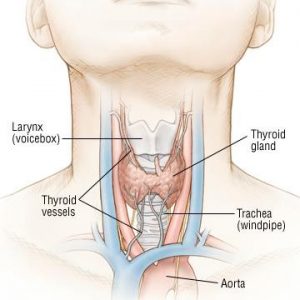FAQ created by Prof. Dr. Iyad Hassan (M.D, FACS, FRCS) General and Endocrine Surgeon/ Head of General, Endocrine and Cancer Surgery Burjeel Hospital
What is Thyroid Gland?
 The thyroid is a butterfly-shaped gland that sits in your neck, draped across the windpipe and just under the larynx (voice box, adam’s apple.) It makes thyroid hormone, which controls your body’s metabolism, including weight, heart rate, temperature, and mental alertness. An enlarged thyroid is called a “goiter.” Most thyroids with a goiter or a lump still work properly, but some may be overactive.
The thyroid is a butterfly-shaped gland that sits in your neck, draped across the windpipe and just under the larynx (voice box, adam’s apple.) It makes thyroid hormone, which controls your body’s metabolism, including weight, heart rate, temperature, and mental alertness. An enlarged thyroid is called a “goiter.” Most thyroids with a goiter or a lump still work properly, but some may be overactive.
What are the symptoms of thyroid problems?
Each thyroid problem has its own symptoms. Here are common symptoms to look for with each condition: Hyperthyroidism: Weight loss, rapid heartbeat, anxiety, fatigue, trouble sleeping, tremors and sweating. Hypothyroidism: Thinning hair, weight gain, fatigue, muscle weakness, joint pain, depression and impaired memory. Thyroid cancer: A lump on your neck, difficulty swallowing, swollen lymph nodes and changes in your voice. Thyroid nodules:
Thyroid gland is a small, butterfly-shaped gland present at the base of the neck below the Adam’s Apple. It is a part of the endocrine system which releases hormones and regulates the body’s metabolism. Disorders can arise when the thyroid gland secretes too much hormones (hyperthyroidism) or low amount of hormones (hypothyroidism). Some common disorders include Hashimoto’s disease, Graves’ disease, goiter, and thyroid nodules. Hyperthyroidism Hyperthyroidism refers to a condition where the thyroid gland is too overactive and produces excess hormones. Hyperthyroidism affects 1% of women and is less commonly seen in men. Graves’ diseases are generally linked to hyperthyroidism and affects over 70% people with overactive thyroid glands. The presence of nodules on the thyroid gland is known as multinodular goiter or toxic nodular goiter. This can also be the cause of hyperthyroidism. Hyperthyroidism is linked to symptoms like nervousness and restlessness with a racing heart and irritability. This can lead to shaking, profuse sweating, anxiety, troubles with falling and staying asleep. External symptoms include thinner skin, brittle nails and hair, weight loss and bulging eyes (characteristics of Graves’ disease). Hypothyroidism The polar opposite of hyperthyroidism, hypothyroidism is caused by an underactive thyroid gland. The conditio
The endocrine system is one of the important parts of a human body that produces/secrets hormones to allow body organs to work properly. Hormones are responsible for regulating body processes like fluid balance, virilization, weight control, growth, appetite, breathing and feminization. The system consists of different glands, namely adrenal glands for kidneys, thyroid in the neck, pancreas, testes and ovaries and hypothalamus and pituitary glands in the brain. The liver, intestines and stomach also produce hormones to ensure proper digestion. Sometimes, these glands start to lose their efficiency and performance because endocrine glands encounter some disorders that affect a certain body function. Usually, the problems are related to adrenal glands, pancreas, pituitary and thyroid glands. Here, the thing to mention is that some disorders have mild effect while some cause serious diseases that need immediate treatment. Since body parts have different glands, their symptoms of endocrine disorders are also different. Let’s find out some of them: Diabetes Diabetes mellitus is a common endocrine disorder that stops the pancreas from producing sufficient amount of insulin or when produced, restricts the body from using it. The symptoms for type 1 and 2 diabetes are:
- Fatigue and frequent urination
- Excessive hunger or thirst
- Vomiting and n
As a network of glands, the endocrine system is responsible for producing and maintaining hormonal requirements for different body functions. Whether it’s about giving strength to convert calories into energy for organs and cells or controlling heart beat, tissue and bone growth, the endocrine system needs to work well throughout a human life. The system is also crucial to avoid diabetes, sexual dysfunction, growth, thyroid and various other hormonal disorders. Its feedback system is responsible to balance hormones in the bloodstream. If the body is having any sort of deficiency, the system would send signals to the respective gland(s) so that the problem can be solved immediately. Usually, hormonal imbalance occurs when the system loses its efficiency to maintain the right level of hormones, thus causing the person to suffer from different problems. Sometimes, the hormonal level becomes higher or sometimes it gets lower. A person should diagnose the root cause of his/her problem by considering the following causes:
- Improper functioning of the endocrine feedback system
- Infection
- Disease
- Genetic disorder
- Tumor in a gland- that doesn’t spread to other body parts
- Injury to a gland
Types of Endocrine Disorders According to numerous researches and scientific studies, there are different type


